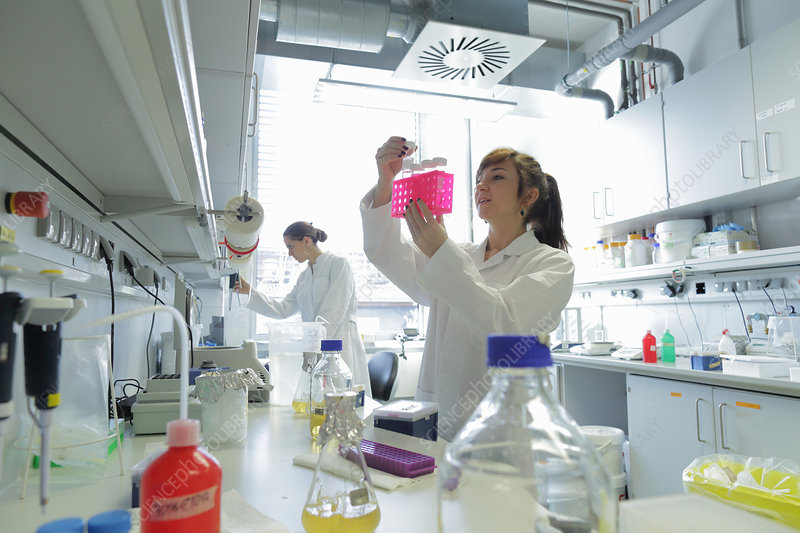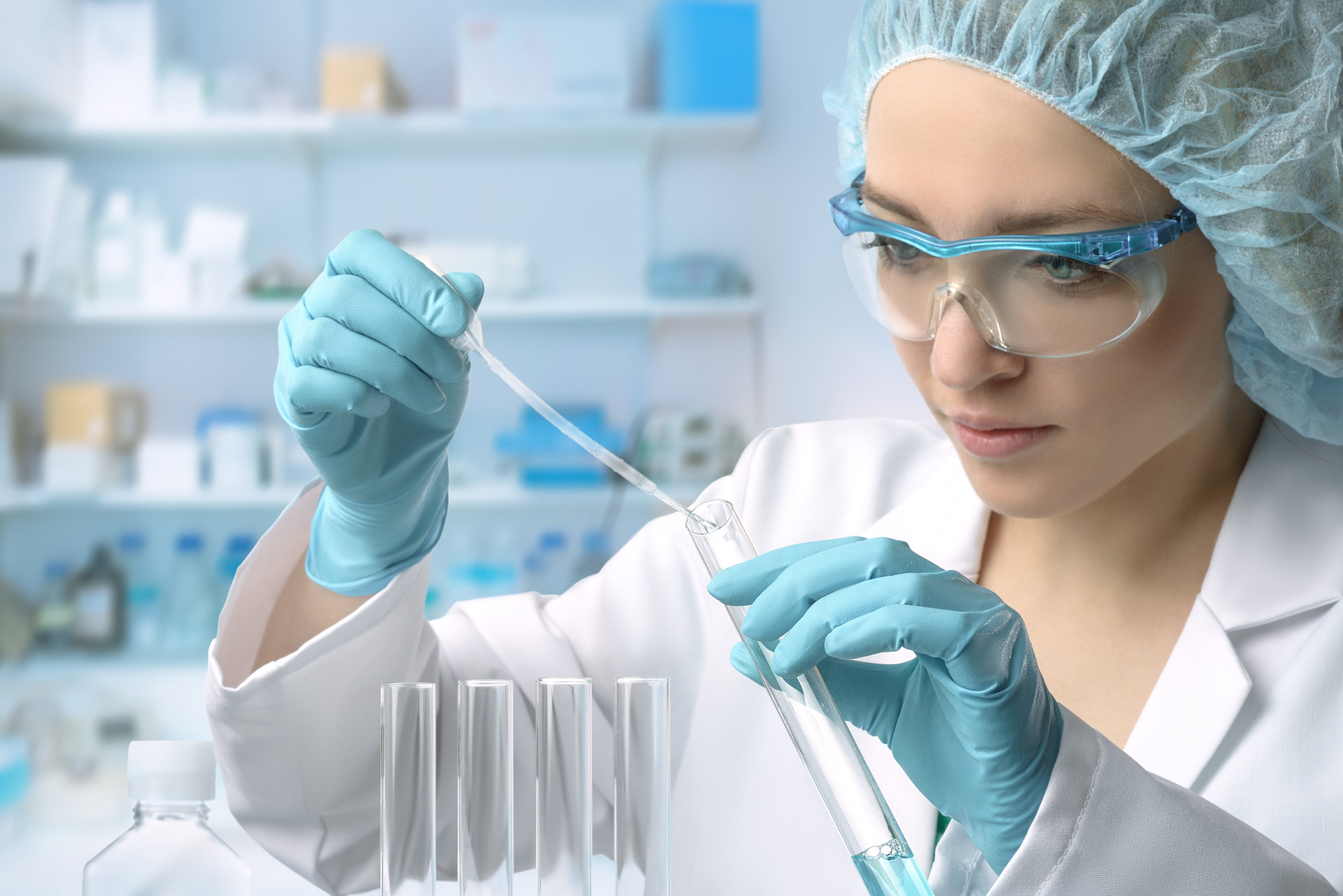Understanding how to become a lab technician starts with earning a Level 3 Diploma or BTEC in applied science or a related field. Gain hands-on experience through internships or apprenticeships to build practical skills. Consider pursuing a Bachelor’s Degree to further enhance your qualifications. Finally, apply for lab technician positions, highlighting your technical expertise and attention to detail.
What Are the Main Types of Lab Technicians?
A lab technician is an important member of any staff working in various industries. They operate in scientific, medical research, testing and development laboratories, as well as in food, pharmaceutical, industrial, and chemical producing facilities. The scope of work is wide, and lab technicians can specialise in different areas across various types of laboratories.
Below is a detailed discussion that illustrates the main types of lab technicians and the functions they perform:
- Medical Laboratory Technician: Medical lab technicians work in healthcare settings, such as hospitals or diagnostic laboratories, analyzing bodily fluids and tissues to assist in diagnosing diseases. They test blood, urine, and other samples using a range of laboratory equipment.
- Chemical Laboratory Technician: Chemical laboratory technicians assist chemists and chemical engineers in preparing for and performing research, quality control, and testing. They work in pharmaceuticals, environmental science, and manufacturing, conducting experiments and analyses on chemical compounds.
- Biological Laboratory Technician: Biological lab technicians support biological and microbiological scientists by preparing samples, conducting experiments, and growing cultures. They analyse biological specimens, such as plants and animals, and work in fields like biotechnology, environmental research, and agricultural research.
- Forensic Laboratory Technician: Forensic lab technicians operate in crime labs and assist forensic scientists in analysing physical evidence collected from crime scenes. Their activities may include testing blood samples, hair, fibres, and other materials to help solve criminal cases.
- Food Laboratory Technician: This role involves performing food and beverage testing for wholesomeness, safety, quality assurance, and compliance with regulatory standards and guidelines. Technicians analyse individual ingredients and finished products to ensure they meet food safety standards.
- Environmental Laboratory Technician: Individuals in this occupation analyse air, water, soil, and other environmental samples to determine the extent of pollution and test for compliance with environmental regulations. Environmental laboratory technicians may work for federal, state, or local government agencies, engineering firms, environmental scientific services firms, or testing laboratories.
- Pharmaceutical Laboratory Technician: These laboratory technicians work within pharmaceutical companies, assisting with drug research, development, and quality control. They evaluate new compounds, determine chemical components, and test medications to ensure they are suitable for sale and meet regulatory guidelines.
What Does a Lab Technician Do?
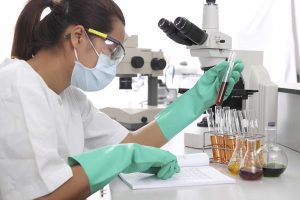
Lab technicians support scientific research and analysis by preparing, conducting, and documenting laboratory experiments. Their specific duties vary depending on their area of expertise, but they are responsible for maintaining lab equipment, following safety protocols, and ensuring accurate results.
These include maintaining lab equipment, following safety standards, and accurately recording results. Here’s a closer look at a lab technician’s main duties and key responsibilities:
- Prepare and Process Samples: Lab technicians prepare biological, chemical, or environmental samples for testing. This includes collecting samples, processing them, and preparing them for analysis using specialised equipment.
- Carry Out Tests and Experiments: Lab technicians perform a variety of tests and experiments based on standard operating procedures. They may use instruments like microscopes, centrifuges, and spectrometers to analyse samples.
- Interpret Results: After performing tests, lab technicians examine the results to determine whether they meet standards or contain abnormalities. They document their findings and share them with scientists, doctors, or researchers.
- Keep Lab Equipment in Good Condition: Lab technicians clean, maintain, and calibrate laboratory equipment and materials to ensure that all tools, instruments, machinery, and controls function properly and safely.
- Document All Findings: Lab technicians are required to write detailed notes about the procedures, findings, and any issues that arise. This documentation ensures accuracy, adherence to regulations, and serves as a reference for future work.
- Follow Safety Procedures: Working in a lab can involve handling hazardous chemicals, biological samples, or other dangerous substances. Lab technicians must follow strict safety protocols to protect themselves, their colleagues, and the integrity of their work.
- Promote Research and Development: Technicians collaborate with scientists and researchers to test materials, gather data, and provide technical assistance for various research projects, including product development, medicines, and new technologies.
Average Lab Technician Salary
Lab technician salaries in the UK can vary significantly, depending mainly on experience, the industry in which they work, and their area of specialisation. Typically, lab technicians working in pharmaceutical companies or medical diagnostics earn more than those in smaller labs or universities. Below is information about typical salaries for a lab technician:
- Entry-Level Lab Technician: Entry-level lab technicians can expect to earn between £18,000 and £24,000 per year.
- Skilled Lab Technician: With a few years of experience, lab technicians typically earn between £25,000 and £30,000 annually.
- Senior Lab Technician: The role of a senior lab technician is varied and carries significant responsibility, often leading to a higher salary. A general technician in a standard lab might expect to earn between £18,000 and £24,000 a year. However, a senior technician working in fields such as pharmaceuticals or forensic science could earn up to £35,000 to £45,000 a year.
Essential Skills of a Lab Technician
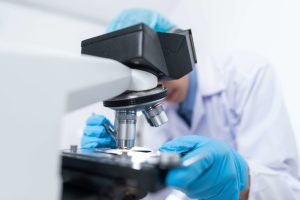
To become a successful lab technician, you need a combination of technical knowledge, attention to detail, and the ability to follow procedures precisely. The skills required for a lab technician’s job also include excellent organisational and analytical skills, which are essential for working effectively in a lab environment. Here are the key skills required for a career as a lab technician:
- Attention to Detail: Lab technicians must be detail-oriented to ensure that experiments and tests are performed accurately. Even small errors can lead to incorrect results or safety risks.
- Technical Knowledge: Lab technicians must be proficient in using laboratory tools, scientific techniques, and analytical procedures. They should also know how to handle equipment such as pipettes, microscopes, and spectrometers.
- Data Analysis Skills: Collecting data is one thing; making sense of it and identifying patterns or outliers is another. Strong analytical skills are essential for producing accurate reports and conclusions.
- Problem-Solving Skills: Lab technicians often need to troubleshoot equipment issues or modify experiments that do not yield results. Critical thinking skills are necessary for effective problem-solving.
- Communication Skills: Lab technicians work closely with scientists, researchers, and other team members. They must be able to communicate their findings clearly and effectively, both in writing and verbally.
- Organisational Skills: Lab technicians are responsible for maintaining records, organising samples, and keeping equipment in working order. Good organisational skills ensure that the lab runs smoothly and efficiently.
- Safety Awareness: Laboratories can be hazardous environments. Chemicals, biological agents, and other factors present risks of harm. Lab technicians must strictly adhere to safety procedures to prevent accidents and ensure a safe working environment.
Lab Technician Tips
Here are some practical tips for aspiring lab technicians:
- Gain Experience in a Lab: Many employers prefer candidates with hands-on experience in a lab setting. Look for internships, apprenticeships, or entry-level positions in laboratories to gain practical experience.
- Get Training in Laboratory Work: Consider doing an internship or working for a few years in a lab. Take courses in laboratory technology, biology, or chemistry. Exposure to common lab equipment and scientific techniques will make you a more competitive candidate.
- Develop Technical Skills: Familiarise yourself with common lab equipment and scientific techniques. Taking courses in laboratory technology, biology, or chemistry can help build your technical skills and make you more competitive in the job market.
- Stay Updated: The science industry constantly evolves. The more you know about the latest technologies and advancements in your field, the more likely you will be to become an effective innovator.
- Obtain Certifications (If Relevant): Some lab technician jobs, especially in specialised medical or forensic science fields, require certifications. Check for any relevant certifications or licensing requirements in your industry.
- Develop Your ‘Soft’ Skills: While the lab is filled with advanced equipment, potential employers are equally impressed by your ability to communicate effectively, work well in a team, and stay organised. Focus on these ‘soft’ skills to excel in your new role as a lab technician.
Lab Technician Requirements
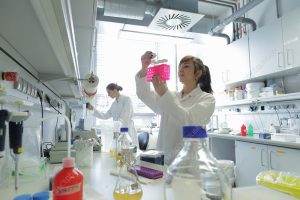
A lab technician typically needs a mixture of education, training, and some experience in the lab. However, the requirements can differ from field to field. Most lab technicians need a qualification in their relevant field and some lab experience. Here are the common requirements for becoming a lab technician:
- Level 3 Qualifications: A Level 3 Diploma or BTEC National Certificate in Applied Science or a related subject (such as biology or chemistry) is often the first qualification a lab technician obtains. These qualifications provide a solid foundation for working in a laboratory.
- Apprenticeships: Some apprenticeships allow aspiring lab technicians to begin their careers while studying towards relevant qualifications at the same time. Apprenticeships exist for a variety of lab technician roles, including those in medical science, pharmaceuticals, and environmental testing.
- Bachelor’s Degree (Optional): While a degree is not always required, some lab technicians pursue a Bachelor’s Degree in a related field, such as biology, chemistry, or biochemistry. This can open doors to more advanced roles or specialisations.
- On-the-Job Training: Many lab technicians receive on-the-job training in specific procedures, safety protocols, and equipment use. This practical training is essential for developing the technical skills needed to succeed in a lab setting.
How to Become a Lab Technician
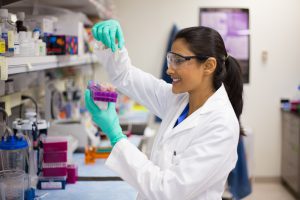
Here’s a step-by-step guide to becoming a lab technician in the UK:
- Earn a Suitable Qualification: A relevant science qualification, such as a Level 3 Diploma in Applied Science, Biology, Chemistry, or a similar subject, is a suitable starting point. A BTEC National Certificate in a scientific discipline is also beneficial.
- Get Work Experience: Seek an internship, apprenticeship, or entry-level position as a lab technician or scientist. Hands-on experience in a laboratory is often necessary for securing a job, making this a critical step.
- Consider Further Education (Optional): If you wish to advance your career or specialise in a particular field, a Bachelor’s Degree in Biology, Chemistry, or a related subject may be a good option. Higher education can help you enter more advanced roles and command a higher salary.
- Apply for Positions as a Lab Technician: Once you meet the requirements, apply for lab technician positions that align with your interests. Tailor your CV to emphasise your technical skills, attention to detail, and relevant experience.
- Continue Studying and Learning New Skills: Science is constantly evolving, so it’s important to stay updated on new techniques, equipment, and advancements in your field. Continue taking courses, attending workshops, or pursuing certifications to enhance your knowledge and career prospects.
Get Qualified as a Lab Technician
Fundamental Concepts of Lab Technicians, Core Concepts for Lab Technicians, Online Training for Laboratory Technicians, Laboratory Sample Contamination Prevention
Frequently Asked Questions
Why Should You Become a Lab Technician?
Working as a lab technician is an excellent way to enter the field of science, running experiments and assisting scientists with research that can have a significant impact on the world. Lab technicians can be involved in various projects, from developing new drugs and saving lives in hospitals to protecting and improving the environment. As a technician, you will have the opportunity to use some of the latest technologies in science and be part of scientific discovery, new product development, and life-saving medical innovations. If you enjoy working in a laboratory and prefer hands-on practical work, then a career as a lab technician could be a great fit for you.
Is Being a Lab Technician a Good Career Choice for You?
If you are interested in detail-oriented work, enjoy solving problems through analysis, and like working in a lab, becoming a lab technician might be the perfect career for you. In this field, technicians can find employment in various industries, including healthcare, biotechnology, environmental science, and forensic analysis. It’s an excellent job for anyone who enjoys working with instruments, conducting experiments, and contributing to research and innovation.
Lab Technician Salaries
The average salary for lab technicians in the UK varies depending on experience, industry, and level of responsibility. A new lab technician can expect to earn between £18,000 and £24,000 per year, while an experienced lab technician typically earns between £25,000 and £35,000 per year. Senior lab technicians working in specialised fields, such as pharmaceuticals or forensics, can earn more, with salaries ranging from £35,000 to £45,000 a year.
Which Qualifications Can Help with a Career as a Lab Technician?
Applicants for lab technician positions typically hold a Level 3 Diploma or BTEC National Certificate in Applied Science, Biology, Chemistry, or a related subject. Those aspiring to higher positions often hold a Bachelor’s Degree in a scientific discipline, such as Biology, Chemistry, or Biochemistry. It is also common for lab technicians to pursue certifications in lab safety, specific equipment, or analytical techniques.
Do I Need Experience to Get Started as a Lab Technician?
Experience is generally necessary to get started, and most employers will expect you to have some experience working in a laboratory environment. You can gain this experience through internships, apprenticeships, or part-time positions in a lab. While most lab technicians receive on-the-job training, prior experience will give you an advantage in your applications.
Lab Technician Career Outlook
Training as a lab technician in the UK could position you well for the future. “The forecasts indicate a sustained demand for lab technicians,” says Haukka. “There are good opportunities in cutting-edge sectors such as healthcare, pharmaceuticals, biotechnology, and environmental science. With new medical research technologies, scientific products, technological developments, and regulatory changes, lab technicians will continue to be needed to support these industries.” Each time new technologies or methods emerge, they offer opportunities for technicians to upskill.
Lab Technician Hierarchy and Progressing Within the Role
Lab technicians can advance to more senior roles, such as Senior Lab Technician, Lab Supervisor, or Lab Manager, which come with greater responsibility for supervising experiments, managing teams and staff, and ensuring adherence to safety regulations. Some may specialise further in areas such as forensics, biotechnology, or pharmaceuticals, leading to higher-paid and more complex roles. Additionally, lab technicians may transition to related positions such as research assistant, scientific analyst, or quality control specialist.
Lab Technician Exit Options and Opportunities
Lab technicians might move into more senior scientific roles, such as laboratory management, research and development, or quality assurance. Alternatively, they may choose to continue studying and training to become biomedical scientists, clinical scientists, forensic analysts, or even transition into sales or technical support roles for scientific equipment or products.

